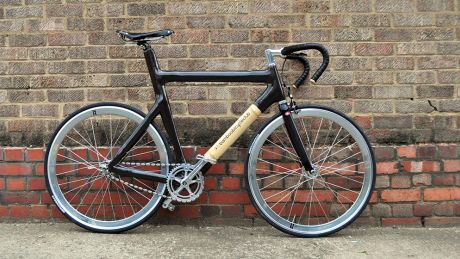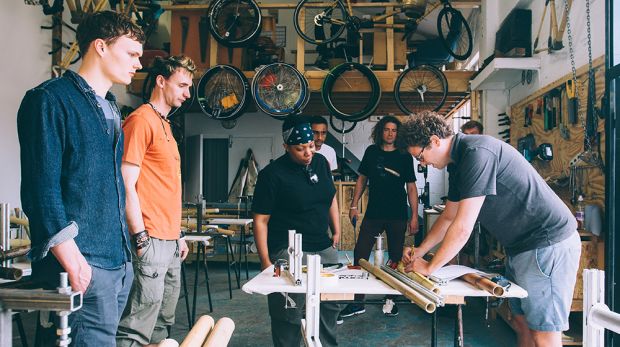How to Make a Bamboo Bike with the Bamboo Bicycle Club
If you want your cycling to be a bit more personalised, here’s a bespoke bicycle experience like no other

Tucked away in a workshop just across the River Lea from the Olympic Park is perhaps the most unique bike workshop in London. For the past four years, people have been visiting the Bamboo Bicycle Club to make their own bespoke bike frame from the giant woody grass, and demand remains high, with the weekend workshops booked out months in advance.
Doing it yourself is a key part of the Bamboo Bicycle Club – there’s no option to purchase a ready-made bike. You can either sign up for the two-day workshop, or buy a home-build kit. At the end of the weekend workshop you will have constructed whatever kind of frame you want from scratch, with the level of customisation on offer a major part of the appeal.
Then there’s the bamboo itself. While it’s not most people’s first thought as the ideal material for a bike, it’s actually more or less perfect. With natural suspension, it delivers an incredibly comfy ride. I can testify to that myself, having ridden my traditional road bike to the Bamboo Bicycle Club, where I tried out a bamboo fixie, and was shocked to find out how much smoother the latter ride was. Bamboo is also light, sustainable, and far more durable than you might expect. I spoke to the club’s founder, James Marr.
So why bamboo?
If you’re learning to build a frame it’s really accessible; anyone can come in and learn. It builds a very good bike – it’s naturally got road-dampening qualities, so it’s very comfortable to ride, and if they’re built correctly you get good performance. We’ve built bikes for people who are serious road racers and the feedback is that it’s like a high-end carbon bike. Ultimately it’s about customising a bike – you don’t have to buy a bike that’s presented to you in a shop.
You can come here, get something made that fits, which is really important, and pick the colours. You can pick all your own components and create something that no one else has got. That’s what inspired me, and as an engineer I would never have kept going if the bikes were rubbish. It’s got to be as good or better, or what’s the point?
How long do they last?
If you look after them, they’ll last. We do everything we can to make sure the bikes are built correctly and that they’re weather-sealed, so you can use them in all conditions. When I began I didn’t realise what people would do with the bikes. We’ve had people going round the world, people doing stunts on them, racing them off-road. You start to see how strong the frames are and what can be done. That gives you some idea of the longevity. There are bamboo bikes that are 120 years old still in existence.
Why is it important for people to build their own bikes?
Partly it’s to create something unique that we invest in. It’s important to learn skills and understand them. You’ve got complete control – it’s yours, and you’re actually making a bike for a purpose, rather than just walking into a shop. You’ve never really ridden a bike until you’ve built one.
Get the Coach Newsletter
Sign up for workout ideas, training advice, reviews of the latest gear and more.
Can anyone do it?
We have a lot of schoolkids building them. We have fathers and sons, daughters and mothers, we have a whole family from France coming over next week. I’d put it out there that I can teach anyone.
The Weekend Workshop

The weekend I went down, the workshop was full, with four people making bikes. It wasn’t just locals – one had travelled from Holland to take part.
Before you arrive, you discuss with James what kind of bike you want, and it can be anything – road bikes, MTBs, fixies, even a fatbike – and provide your measurements. When you arrive the frame will have been designed according to those specs, and then it’s up to you to make it happen, although there will be plenty of expert help on hand.
Over the two days you make the frame based around two triangles of bamboo, with hemp fibre securing the joints. Then you can either take the frame home to build the rest of the bike yourself, or come back to the workshop another time to fit the components.
I asked fellow bamboo bike builders, sustainability consultant Nick Spooner and energy consultant Doug Cook, about the bikes they were crafting.
Why did you opt for bamboo?
Nick I’m interested in the sustainability of the bamboo, and then there’s the sentimental value that building your own bike creates. And it’s a fun weekend as well. My bike got stolen about six months ago. I thought I’d replace it in a different way.
Doug Much the same, plus bikes are always the same size, but people aren’t. I’m tall, and if I was going to buy a bike big enough for my frame, they’re expensive or crap.
What bikes are you making?
Doug A cyclo-cross bike: basically a mountain bike frame with drop handlebars like a racing bike, and stiff forks.
Nick A road bike. Old-school, light, slightly racey. More on the commuter side.
Has the workshop been harder or easier than expected?
Nick Harder. More manual labour than a 21st-century man is used to!
Doug But it’s nice, you meet people passionate about bicycles.
The Bamboo Bicycle Club workshop costs £490 (including materials), and there are optional extra days for bike finishing and component fitting. If you’re confident in your DIY skills, a home-build kit costs £260, bamboobicycleclub.org
Coach is a health and fitness title. This byline is used for posting sponsored content, book extracts and the like. It is also used as a placeholder for articles published a long time ago when the original author is unclear. You can find out more about this publication and find the contact details of the editorial team on the About Us page.

